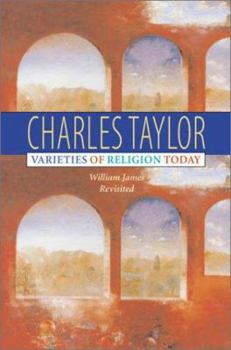Varieties of Religion Today: William James Revisited
(Part of the Institute for Human Sciences Vienna Lecture Series Series)
Select Format
Select Condition 
Book Overview
A hundred years after William James delivered the celebrated lectures that became The Varieties of Religious Experience, one of the foremost thinkers in the English-speaking world returns to the questions posed in James's masterpiece to clarify the circumstances and conditions of religion in our day. An elegant mix of the philosophy and sociology of religion, Charles Taylor's powerful book maintains a clear perspective on James's work in its historical...
Format:Hardcover
Language:English
ISBN:0674007603
ISBN13:9780674007604
Release Date:March 2002
Publisher:Harvard University Press
Length:142 Pages
Weight:0.66 lbs.
Dimensions:0.6" x 6.4" x 6.9"
Customer Reviews
3 ratings
Charles Taylor and William James
Published by Thriftbooks.com User , 16 years ago
Charles Taylor's "Varieties of Religion Today," is a superb reflection on the importance of William James' commentary on religion a century ago. In a precise, brief, and resonant book, Taylor conveys a vivid sense of James' insights, yet provides a valuable critique of his "Varieties of Religious Experience" and "Will to Believe," for the contemporary reader. In addition to being a incisive essay in its own right, "Varieties of Religion Today" is a useful introduction to several of Taylor's other books and principal concerns as a philosopher, including on the ethics of belief. I have already read the book three times, and look forward to returning to it, as each reading reveals another level of understanding and insight into the state of religion and secularism in the U.S. particulary and other Western nations. A virtue of the book for this reader, who isn't a philosopher, is the clarity of language and lack of professional jargon.
Varieties of Reading Experience
Published by Thriftbooks.com User , 20 years ago
This book is a fascinating, thought-provoking meditation on religious issues related to William James' classic work. Taylor's take on religious developments in Western Europe/North America is fascinating and enlightening in several senses of the word. And while truly respectful of William James and his insights, Taylor is no cheerleader and convincingly discusses a number of James' key blind spots along with their probable sources. The book's brevity and readability belies the punch it packs. The one glaring imperfection is the pedantic and pretentious refusal to translate French quotations, some of which seem like they're probably quite important. Too bad, I'll never know for sure.
A reflection on religious belief and the state
Published by Thriftbooks.com User , 22 years ago
This book is a collection of a series of lectures Charles Taylor gave reflecting on the legacy of William James. In thinking about James' work, Taylor reflects on the tensions between private religous experience and public religious expression; the problem of belief and unbelief; and the implications our religious beliefs have for our political organization. It is almost impossible to do justice to the richness of Taylor's thought in a short review.Taylor's first task is to situate James within his own religious context. James inherited the strand of religious belief that was quintessentially Protestant -- with an emphasis on private feeling as against public expression. For James, the ultimate religious experience is private and fundamentally individual. This precludes James from fully grasping the types of religious expression that are more communally-based.Taylor's second task is to reflect on James personal struggle with the question of belief and unbelief. In James' day a strong argument was being made that religious belief is intellectually dishonest. Taylor offers a good summary of James' defense of belief as a viable choice. Finally, Taylor integrates James' thought with the question of how our religious belief interacts with our political structures. Taylor offers an invaluable historical narrative of the variety of relationships between religion and state that we have seen in the past. In doing so, he makes our current dilemmas much clearer. We are moving from a country that has a broad consensus in some sort of belief, but which allows individuals to join whatever church best gives expression to that experience, to a country in which there is no such broad consensus. If there is no shared understanding of the sacred, we are forced to ground our political structures in the purely human. It is not yet clear whether the new project will succeed, but in his reflections on the tensions between belief and unbelief and their relationship to our political organization, Taylor can only enhance our discussions as we move forward into this virgin territory.Taylor's book does presume that the reader has a fairly sophisticated historical sense. And he often makes reference to the situation in France, which can be a bit opaque to those who lack a basic familiarity with French culture. Indeed, he often quotes from French writers without offering a translation. Still, the book offers valuable insights, even to those without the background to fully grasp everything he writes.






